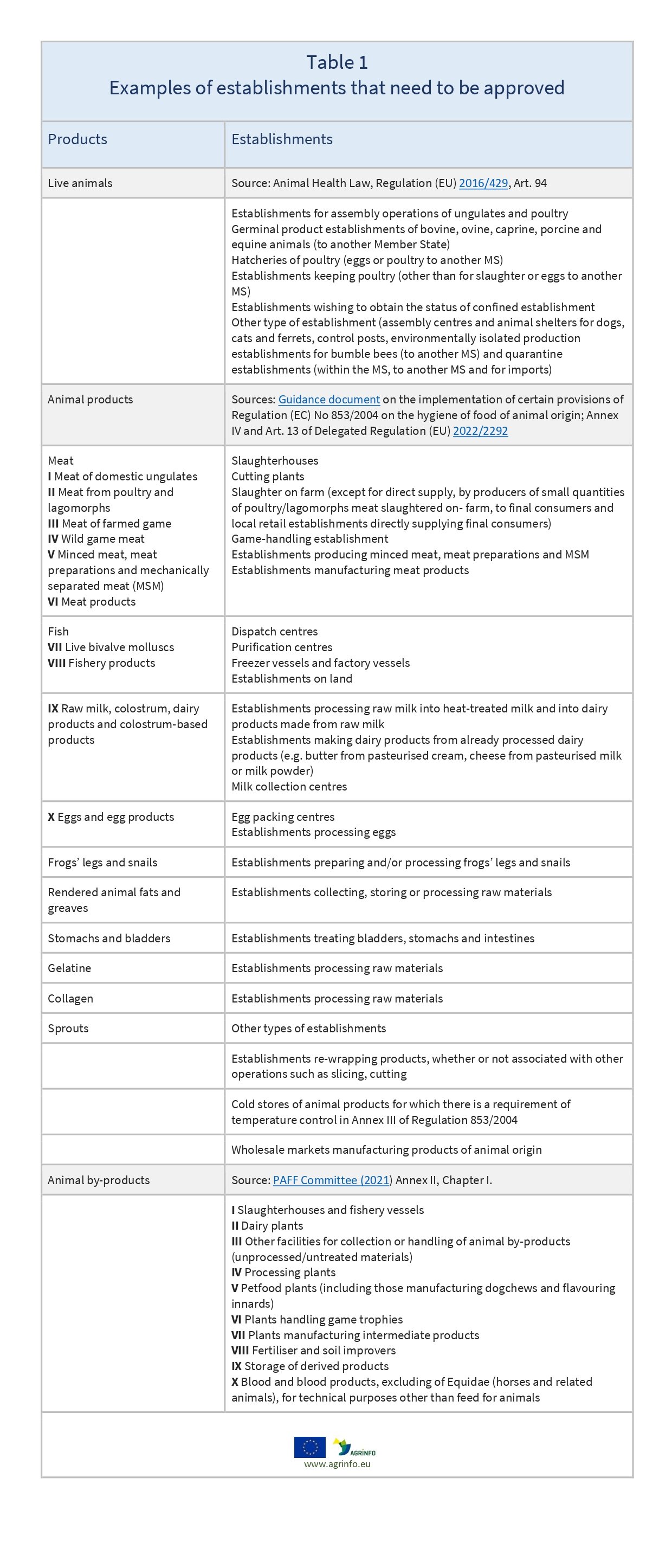Approval of third country establishments explained
- Official controls
Summary
Overview of the rules governing the approval of establishments to allow the export of animals and animal products to the EU.
Rules for approval of establishments allowed to export animals and animal products to the EU
Animal Health Law, Regulation (EU) 2016/429 and Delegated Regulation (EU) 2020/692
Official Control Regulation (EU) 2017/625 and Delegated Regulation (EU) 2022/2292
Update
Overview of the rules governing the approval of establishments to allow the export of animals and animal products to the EU.
Background
Approval of establishments is one of the tools allowing the EU to ensure that only food and feed in compliance with EU legislation is imported. It is alongside the obligation for third countries to be listed by the EU; and the signature of health certificates by third country authorities (see AGRINFO explainers on Third country lists for animal health; Third country lists for public health; EU official health certificates for exports to the EU).
The legal basis for the approval of establishments is:
- Official Control Regulation (EU) 2017/625 (Art. 127.3(e)), and its
- Delegated Regulation (EU) 2022/2292 for exports from third countries to the EU (Arts. 1, 13)
- Animal Health Law, Regulation (EU) 2016/429 (Arts. 94–100; Art. 56 and Annex XIX for captive birds), and its
Delegated Regulation (EU) 2020/692 for exports from third countries to the EU (Art. 8).
Impacted Products
animals, animal products, animal by-products
Overview
Registration of establishments
All operators exporting food to the EU must at least be registered (Regulation 2020/692 Art. 8; Regulation 2017/625 Art. 10). To do so, operators must complete the procedures of the competent authority in the country where they are established. Once registration is completed, the authority assigns the operator a unique registration number.
Approval of establishments
Establishments exporting risky products must be approved and assigned a unique approval number. These are animals and animal products falling under combined nomenclature (CN) Chapters 2–5, 15, 16; specific headings 1702, 2101, 2105, 2106, 2301, 2932, 3001, 3002, 3501, 3502, 3503, 3504, 4101, 4102, 4103; and sprouts (0704 90, 0706 90, 0708 10, 0708 20, 0708 90, 1214 90) (see Council Regulation (EEC) No 2658/87).
Table 1 lists the categories of establishments that require approval. In principle, approval covers all steps in the food supply from the farm onwards, including assembly operations of live animals, when the establishment is doing more than just logistics. (Establishments performing logistics that require temperature control for animal products must also be approved.)
To secure approval, before an establishment can start activities, the competent authority must control its compliance with the legislation on-site. This differs significantly from establishments supplying non-risk foods, which may commence activity as soon as they are registered, and only undergo controls at a later stage.
For live animals, detailed requirements to be fulfilled by the establishment are foreseen in Delegated Regulation (EU) 2019/2035.
Competent authorities of third countries guarantee that establishments are in compliance with the EU legislation by signing health certificates (see EU official health certificates for exports to the EU – explained).
The requirements apply in principle not only to the establishment actually exporting to the EU, but to the whole chain in the third country (slaughterhouse, cutting plant, etc.), including establishments supplying raw material from another third country [Regulation (EU) 2022/2292, Art. 13 (2)].
Regulation (EU) 2022/2292 sets out a few exemptions (Art. 14), and specific rules are foreseen for fishery products (Arts. 18, 19).
Procedure for approval
Since 1 December 2021, a new module, Establishment Lists, is available in TRACES-NT. This replaces the email procedure for establishment listing.
National contact point(s) in the third country are responsible for updating the establishment list. The Commission will then check if all details are correct before publishing the list. Where mistakes are noted, the competent authority will be asked to review its whole list.
Also see Non-EU countries authorised establishments.
What are the major implications for exporting countries?
It is up to third country authorities to approve and control the establishments allowed to export to the EU. Every change in approved establishments must be communicated to the European Commission services.
Resources
Online resources from the European Commission:
- Guidance document on the implementation of certain provisions of Regulation (EC) No 853/2004 on the hygiene of food of animal origin
- IMSOC Establishment Lists
- Non-EU countries authorised establishments
PAFF Committee (2021) Technical Specifications for the Format for the Lists of approved or registered Establishments, Plants or Operators handling Animal By-Products inside the European Union and in Third Countries.
Sources
Tables & Figures

.
Disclaimer: Under no circumstances shall COLEAD be liable for any loss, damage, liability or expense incurred or suffered that is claimed to have resulted from the use of information available on this website or any link to external sites. The use of the website is at the user’s sole risk and responsibility. This information platform was created and maintained with the financial support of the European Union. Its contents do not, however, reflect the views of the European Union.
